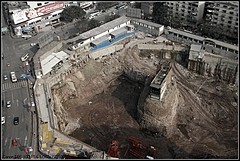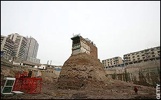On one side are the Chinese Communist Party, multi-millionaire property developers and the full force of globalisation in the fastest-growing city on Earth. On the other, a house, a hole in the ground, and Yang Wu and his wife Wu Ping.
The house stands in the centre of a large pit. The other families left and their homes were demolished
For the time being at least, despite court orders and offers of compensation, the restaurant owners are winning.
In the city of Chongqing, Wu Ping stood defiant before reporters yesterday, the day scheduled by court order for her house’s demolition, and said she was staying put. “The house is still there,” she said. “My husband is inside, and will be there as long as it is.” Around her lay the bulldozed building site – her house, the only one remaining, sitting on an island of mud. Chongqing sits on a fork in the Yangtse river in south-western China. Its population is growing by 500,000 a year – possibly the fastest sustained expansion of any city in any country in history. [Full Text]

Yang Wu’s house looks like an island, standing 10 meters above and in the middle of a vast dug out construction pit. On March 23 the 51-year-old Chongqing resident proudly flew China’s national flag from his house, showing it to the reporters who had come from all over the country.
Almost a month ago a curious netizen photographed Yang’s house, which is in southwest China, and circulated the picture on the Internet. The image soon ignited hot debates and Yang’s house became the most famous house in China overnight.
Netizens called it “the hardest nail house in China.”
The phrase “nail house” is often used by real estate developers to describe the building of an owner who is reluctant to be moved out when his property is slated for demolition. [Full Text]
Read also John Kennedy’s post on Global Voices: Homeowners hold their ground.










